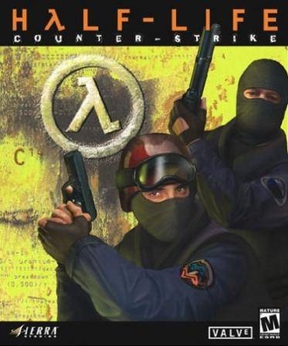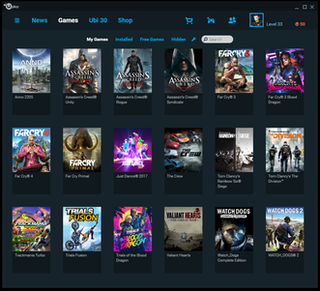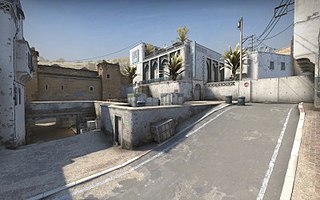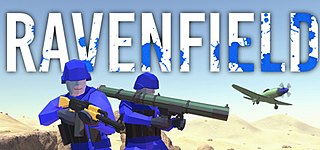
Counter-Strike is a tactical first-person shooter game developed by Valve. It was initially developed and released as a Half-Life modification by Minh "Gooseman" Le and Jess Cliffe in 1999, before Le and Cliffe were hired and the game's intellectual property acquired. Counter-Strike was released by Valve for Microsoft Windows in 2000, and is the first installment in the Counter-Strike series. Several remakes and ports were released on Xbox, as well as OS X and Linux.

Counter-Strike: Source is a tactical first-person shooter video game developed by Valve and Turtle Rock Studios. Released in October 2004 for Windows, it is a remake of Counter-Strike (2000) using the Source game engine. As in the original, Counter-Strike: Source pits a team of counter-terrorists against a team of terrorists in a series of rounds. Each round is won either by completing an objective or by eliminating all members of the enemy team. The game was initially bundled with all retail and digital copies of Half-Life 2, before being released standalone.

Counter-Strike Online (CSO) is a tactical first-person shooter video game, targeted towards Asia's gaming market released in 2008. It is based on Counter-Strike and was developed by Nexon with oversight from license-holder Valve. It uses a micropayment model that is managed by a custom version of Steam.

Doom is a 2016 first-person shooter game developed by id Software and published by Bethesda Softworks. It is the first major installment in the Doom series since 2004's Doom 3. Players take the role of an unnamed space marine, known as the "Doom Slayer", as he battles demonic forces from Hell that have been unleashed by the Union Aerospace Corporation within their energy-mining facility on Mars. The gameplay returns to a faster pace with more open-ended levels, closer to the first two games than the slower survival horror approach of Doom 3. It also features environment traversal, character upgrades, and the ability to perform executions known as "glory kills".

Ubisoft Connect is a digital distribution, digital rights management, multiplayer and communications service developed by Massive Entertainment to provide an experience similar to the achievements/trophies offered by various other game companies. The service is provided across various platforms. Ubisoft Connect is used exclusively by first-party Ubisoft Entertainment games, and although some third-party ones are sold through the Ubisoft store, they do not use the Ubisoft Connect platform.

Counter-Strike: Global Offensive (CS:GO) is a 2012 multiplayer tactical first-person shooter developed by Valve and Hidden Path Entertainment. It is the fourth game in the Counter-Strike series. Developed for over two years, Global Offensive was released for OS X, PlayStation 3, Windows, and Xbox 360 in August 2012, and for Linux in 2014. Valve continues to regularly update the game, both with smaller balancing patches and larger content additions.
Counter-Strike (CS) is a series of multiplayer tactical first-person shooter video games in which teams of terrorists battle to perpetrate an act of terror while counter-terrorists try to prevent it. The series began on Windows in 1999 with the release of the first game, Counter-Strike. It was initially released as a modification ("mod") for Half-Life that was designed by Minh "Gooseman" Le and Jess "Cliffe" Cliffe before the rights to the mod's intellectual property were acquired by Valve, the developers of Half-Life, who then turned Counter-Strike into a retail product released in 2000.

Foxhole is a cooperative sandbox massively-multiplayer action-strategy video game developed and published by Canadian video game company Siege Camp, who are based in Toronto, Ontario. The game uses Unreal Engine 4, utilizing an axonometric projection perspective, much like that of a conventional real-time strategy video game with a top-down view. Foxhole's setting is "inspired by early 20th century warfare". The game allows the user to join one of two factions as a soldier, having the choice of contributing to a persistent war by gathering, manufacturing, and transporting resources and supplies, providing manpower and vehicles in combat, and building and managing fortifications, with the end goal of annihilating the opposing faction. The game was released on September 28, 2022, for Microsoft Windows.

"Dust II", also known by its filename de_dust2, is a video game map featured in the first-person shooter series Counter-Strike. Dust II is the successor to "Dust", another Counter-Strike map, and was developed by David Johnston before the official release of the original Counter-Strike game. It was designed with the aims of simplicity and balance, based on its symmetrical design and two points, over which the two teams must fight for control.

Endless Express is a first-person simulation video game developed in 2014 by Florian Veltman, Alexandre Taillefert, Martin Gugger, Felix Meunier, and Baptiste Virot. The game was first created as part of a 7-day game jam, but was later "reimagined" and re-titled "The Endless Express" in 2016, however, the project was discontinued, with its work-in-progress build publicly released. Endless Express was released on Microsoft Windows, MacOS, and Linux systems.

Rise of Industry is a business tycoon game developed by Spanish indie team Dapper Penguin Studios and published by Kasedo Games. The game sees players build and manage their industrial empires as they attempt to grow and expand in the early 20th century.

Ravenfield is a low poly first-person shooter game developed by Swedish programmer Johan Hassel, who goes by the pseudonym SteelRaven7. It was released on 18 May 2017 as an early access title for Windows, macOS and Linux.

Hitman 2 is a 2018 stealth video game developed by IO Interactive. It is the seventh main installment in the Hitman video game series, the sequel to 2016's Hitman and the second game in the World of Assassination trilogy. The game continues the story arc started in Hitman, following genetically engineered assassin Agent 47 as he searches for the mysterious "Shadow Client" who is trying to destroy Providence, a secretive organization that controls global affairs. It also explores more of 47's mysterious background, which Providence offered to bring to light in exchange for 47's assistance. Like its predecessor, the game is structured around six large sandbox locations that players can freely explore to find opportunities to eliminate their targets. It also included two online multiplayer modes called Sniper Assassin and Ghost Mode, though the game's servers for both modes have since been shut down; Sniper Assassin can still be played single-player.

Totally Accurate Battlegrounds (TABG) is a multiplayer battle royale video game developed by Swedish studio Landfall Games, and a spin-off of Totally Accurate Battle Simulator (TABS). Similarly to how TABS parodies the battle simulator genre of video games, TABG is a parody of the battle royale genre, primarily titles such as PlayerUnknown's Battlegrounds and Fortnite, and features exaggerated player and weapon physics. The game was released on Steam on June 5, 2018.

Dujanah is an art video game developed and published by Jack King-Spooner, a Scottish indie game developer. It was released on September 19, 2017. The game follows Dujanah, a Muslim woman in a fictional country under the occupation of foreign powers in a stylized magic realist–style world as she tries to find out what happened to her husband and daughter. The game focuses on the theme of death, and explores it through the stories of people that Dujanah meets as she walks through her country. Reception to Dujanah was positive, with praise focused on its themes and storytelling.
No Players Online is a short horror game released on Itch.io, a website for distributing indie games. It was created by Belgian university students Adam Pype and Ward D'Heer and sound designer Viktor Kraus as part of the Haunted PS1 Jam in November 2019. Initially intended to be a twenty-minute horror game, the developers continued to expand the game into an alternate reality game (ARG) involving cryptic messages and secret passcodes. Players quickly solved the ARG on a dedicated Discord server.

Inferno, also known by its filename de_inferno, is a multiplayer map in the Counter-Strike series of first-person shooter video games by Valve Corporation. The map was first created for the original Counter-Strike in a 2001 update and has subsequently appeared in each series entry. While considered a traditional map in the series, its design differs from maps such as Dust II, featuring many hiding spots and branching, narrow paths.

"Nuke", also known by its filename de_nuke, is a multiplayer map in the Counter-Strike series of first-person shooter video games by Valve Corporation, centered around bomb defusal. Set outside and inside the premises of a nuclear power plant as counter-terrorists attempt to repel a devastating attack, it was first released in November 1999 for the original Counter-Strike. It received a significant redesign in 2016 for Counter-Strike: Global Offensive as part of the "Operation Wildfire" update, which added more realistic detail and tweaked its layout. Another update was made to the map in 2018. It is used heavily in competitive play, and continues to be divisive for its design even after its revamp due to its complex layout and large open areas. It is notorious for being a haven for the defending team.

Counter-Strike surfing is a modded game mode based on the Counter-Strike series of first-person shooter video games. Consisting of custom-created obstacle course levels known as surf maps, players make use of a physics engine glitch to float along inclined planes while propelling themselves forward at high speeds in a manner resembling surfing. Accidentally invented by Charles "Mariowned" Joyce in the original Counter-Strike, surf maps gained significant popularity and continued to appear as fan-made levels in every game since. The game mode has been praised by both fans and critics for its casual and relaxing nature compared to typical Counter-Strike gameplay.

















